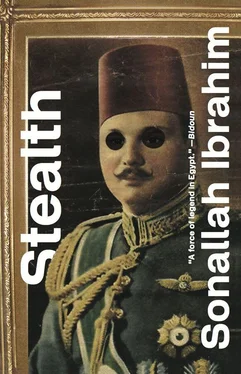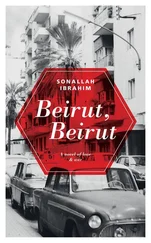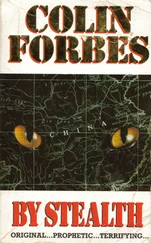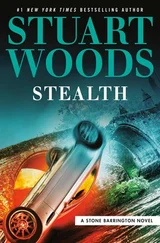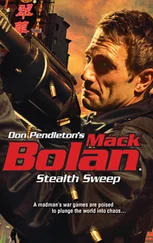I go back towards the square then stop in front of the tobacconist on the corner. I buy a pack of cigarettes for father. The salesman gives me a green pack instead of the yellow one I asked for. I go back home, tripping over a water jar in my path. Mud covers my twisted sandals made from tire rubber. I wipe them across the steps to the front door trying to get rid of it. I turn the key in the door to the apartment. The lamp in the living room still lights up the room as when I left. The door to the constable’s room is closed. The sound of the radio comes floating out from behind it. The door to our room is also closed. I put the pack of cigarettes on top of the sideboard. I come up to the wash basin. I take off the sandals and wash them.
I pick up the pack of cigarettes and head into our room. Father is sitting cross-legged on top of the bed. His eyes are red and he is frowning. He’s always this way after he wakes up from an afternoon nap. I hand him the pack of cigarettes. He blows up in anger: “Didn’t I tell you ‘Tuscany’? Now you’ve gone and brought me Tuscanilly.” I say the salesman gave me that pack. “Don’t you have a tongue to tell him what you want? You’re totally useless all the way around.” I offer to go back to the shop and exchange the pack. He cools off a bit and says: “That’s okay. Maybe he doesn’t have the right ones. Make me a cup of coffee.”
I go out to the living area. Stand in front of the sideboard. Take down the small brass coffee kettle. I put a spoon of coffee and another of sugar in to the kettle. I pour in the water from the jug and take up a spoon to stir it all together. There’s an alcohol stove sitting at my eye level. I take off the brass cover and strike a match to light the flame. I set the tiny coffee kettle on it. Mama Tahiya’s door is still closed and the sounds of the radio still echo behind it.
I step over toward the door to the skylight. Um Zakiya’s window is shut. I hurry back to the coffee and wait there patiently until it starts to bubble up. I pull away the kettle before it boils over. I put it back over the flame a few more times then put the brass cover back on to put out the flame. Carefully, I pour the coffee from the kettle into a cup then pick it up and take it to our room. I’m walking slowly to make sure not to shake the cup so much that the coffee loses its frothy head. He takes the cup from me and I bring him the jar of water. He takes a loud slurp from it. Mother raises the jar up in the air and pours water into her mouth without her lips touching the edge. I try to do the same and get my clothes all wet.
He lights a cigarette. I sit at my desk. Pour some seeds from the tube out in front of me. I open the English reader. He finishes drinking his coffee, gets off the bed, and throws a towel over his shoulder. He lights a lamp and heads towards the bathroom to wash for prayer. When he comes back in, he stretches out the prayer rug on the floor. He prays the sundown prayer. He pulls open the glass doors to the balcony, and pushes out the wooden shutters to open them too. He drags the desk chair over to the narrow balcony, sits down, and lays his right arm on its metal railing. I stand next to him. Mother comes in with a cup of coffee singing: “I am in love and I bring you your coffee.” My father slurps the coffee loudly. He lights his black cigarette. He sits next to the open window. He leaves his cigarette sitting on the ashtray. Gets up to pray the sundown prayer. He comes back to relight his cigarette. A gas worker appears at the top of the street. He leans his ladder against a lamp post, climbs up, pulls open the glass pane of the lamp, relights it, closes the glass pane again, and comes down. He puts the ladder on his shoulder. He moves to the next lamppost.
The balcony across from us is closed and dark. The window next to it is opened and lit up. We know it is a guest room that is only opened when they have visitors. Its curtains are rippling. There is a pale light in the apartment on the second floor where the iron merchant lives with his two wives. The light is in the first wife’s room. It’s put out and then comes on in the room of the second wife. The voice of Um Safwat screams at her son. Our Coptic neighbor Abu Wadie, appears coming out from the entrance to the alley. He wears a dark suit. He carries sacks under his arms. He stops in front of the door to our house, and calls just like every night: “Wadie!” He exchanges good evenings with father. His wife answers him from the apartment above ours. Just like every night, he says to her: “The basket.” She lowers it down to him so he can put the sacks in it. The basket goes up slowly. He comes in to the house.
Father leans his head over so he can see Sabry Effendi. His oldest daughter Siham has on a sleeveless nightshirt. She’s leaning over with her chest against the edge of the window. Behind her, her sisters are making a commotion. Her eyes are fixed on the entrance to the alley. She pulls back inside when the young man who lives in the room on the roof appears. He’s a handsome engineering student. His skin is white, like the foreigners, and he wears glasses with gilded frames.
Father draws back his head. He watches the window next to the balcony across from ours. The breeze is wafting through its curtains. There’s a chair with a high back and a man in a dark-colored suit is sitting in it. There’s a low table in front of him with little black things in rows arranged on top of it. He turns them in his hand and then puts them back carefully.
He says: “I wonder if that’s the groom?” We know that Hikmet is supposed to be having an engagement party today. Father tells me to turn off the light. We sit in the dark with our eyes fixed on the window across from us. Abu Zakiya comes up from the direction of the entrance to the alley. He’s thin and dark with grey hair. One of his eyes is closed all the way. He walks slowly, as though he is tired out. He’s so quiet by nature that you hardly hear his voice. He does not notice us before he goes into the building next door. Father says: “How strange that they found each other.” He means his wife, who is white and much younger.
He stretches out his head and focuses on something: “What are those things over there?” I try to follow his gaze. Are they glasses of sherbet punch? No one’s going near them. In fact, there’s no sign of anyone else around, as if no one is in the room but the man in the chair. No one is ululating and there are no sounds of a party. Father says: “It could be little lumps of hashish for a hookah.” After a while he adds: “That’s weird. Look harder.”
I balance my glasses again and take a harder look, but I can’t make out the black things. Father suggests that I wipe the lenses of my glasses. I go back into the room and wipe them with the bed sheet. I go back to the balcony. The man is still sitting looking at the little things in front of him. Father stretches his arm out to me without turning toward me. He whispers: “Loan me your glasses.” I take them off and hand them to him. He brings them close to his face without putting them on. He shakes his head, then he hands back the glasses, saying: “It’s no use.”
He prays the afternoon prayer. He sits me down in front of him on the bed. He rests his glasses on the end of his nose and, from the geography book, begins to explain to me the difference between straits, a gulf and an isthmus. He scolds me for forgetting. He’s annoyed. Gives me memorization exercises. He dresses and goes out. I hear him ask Mama Tahiya if she will look after me and say that he’ll probably be out until late.
I listen to his steps falling on the stairs and wait to see him come out into the lane, then I leave our room. Mama Tahiya is hanging her laundry out on the clothes line strung between the entrance to the living room and the door to her room. She has brought out a bucket of water and is cleaning the room and washing down their door with soap. I bring her jugs of water from the sink. She wipes down the floor of the living room while singing, “I’ll meet him tomorrow and the day after. .” She brings in the primus stove from the kitchen along with the small wooden foot stool that sits just inches off the ground. She puts them both in the middle of the guest room next to the washbasin made of zinc. She brings in half a cup of sugar from her room. She adds half a cup of water to it and stirs them for a long time, then pours the mixture into a small metal pan. She puts it on the fire, pulls the end of her dress up between her legs, and sits down on the stool. Fading sunlight comes in from the window to the skylight. It falls across her bare knees.
Читать дальше
